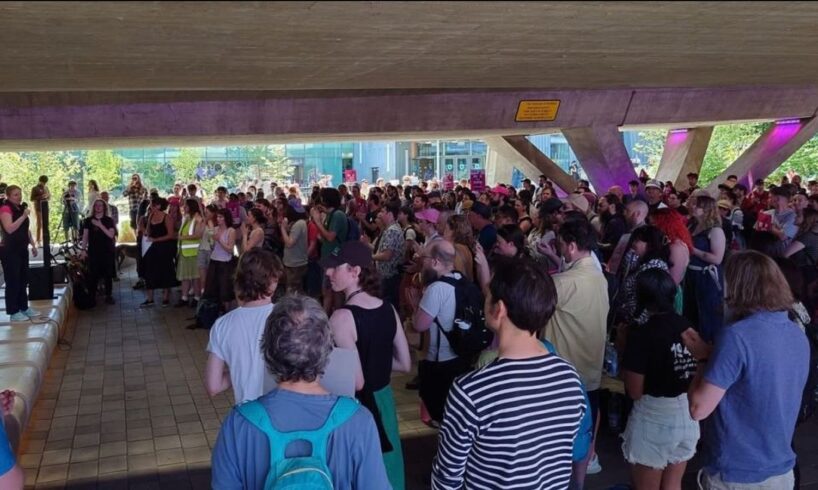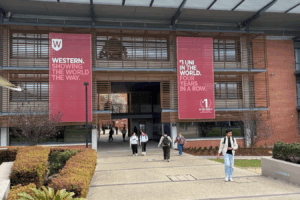
University and College Union (UCU) members at the University of Sheffield (UoS) and Sheffield Hallam University (SHU),have voted in favour of strike action over ongoing job losses.
Balloted separately in September staff at both universities – academic, lecturers, researchers, support and professional services staff – voted for strike action with majorities of 77 and 79 percent respectively. In both instances the ballot turn-out totalled just over 50 percent. This is not because militancy is in short supply. Sheffield university workers are angry, but they evidently have little faith in the UCU leadership to wage a struggle that satisfies their demands.
University of Sheffield staff rally as they begin industrial action on April 30 [Photo: RotherhamTUC/X]
The UCU has now confirmed four weeks of action at UoS starting November 17 and ending December 12—consisting of four days of strike action per week. No dates have been confirmed at SHU.
This is the second successful strike ballot by workers at UoS since May last year when they voted for 10 days of action against mass redundancies. The membership at SHU walked out in March this year for two days after management delayed a paltry 2.7 percent increase for more than half a year without back pay.
The simultaneous vote for two strikes in one city is the latest manifestation of a protracted nationwide struggle, now approaching a decade, between higher education workers and management over savage job cuts, falling salaries, deteriorating pensions and the precipitous decline of working conditions, especially growing workloads.
Research by the UCU calculates UK universities have announced more than 12,000 job cuts in the last year alone. Additional cost savings announced in the same period amount to a further 3,000 jobs. This is a huge escalation since the union reported in March that 5,000 jobs were threatened. In September the TES (Times Education Education) revealed an astonishing 4,000 UK HE courses have been closed since 2024.
The UCU did not explain how this huge and swift destruction of academic jobs, departments and courses took place under its nose.
In May, academic staff at five UoS schools were encouraged to apply for voluntary redundancy. Then on September 11, the university announced these attacks would be extended to another five schools. Over 350 workers have already taken the voluntary redundancy scheme offered by UoS since last year.
In early October David Hayes, president of UoS UCU branch, told TES that the branch committee, following consultation with union members at a “well attended” branch meeting, wanted four weeks of continuous strike action, composed of four strike days per week. Hayes explained how the votes “indicate the depth of concern that our members have about the ongoing campaign of job cuts being pursued by the university.”
But the UCU’s agenda is not for a fight. They plan to stifle strike action and are calling on the university to commit to voluntary redundancies and reaffirm their commitment to no compulsory redundancies, and to negotiate on working conditions and other means of financial savings agreed when the union curtailed strike action in May. A UoS UCU spokesperson stated, “Our negotiators are continuing to meet with management, and we hope this strong mandate encourages management to make an offer that will avert the need to take this strike action.”
The job cuts in Sheffield are part of the attacks waged across the Higher Education (HE) sector, that are integral to a nationwide restructuring programme to remain competitive in the global university market.
On October 10 UCU General Secretary Jo Grady said, “Overpaid vice-chancellors are carrying out brutal cuts and have caused an existential moment for the UK higher education sector… Staff cannot be made to pay the price for management failures.”
UCU leader Jo Grady speaking at the UCU’s London rally, November 30, 2022
Explain the crisis as the result of rogue individuals is political deflection. Grady added, “The Labour government must also stop looking the other way.” But Starmer’s Labour government is not “looking the other way”, they are driving forward the cuts with a projected net reduction of £2 billion in central government funding over the next two years.
SHU are demanding more redundancies in addition to the 500 staff who accepted terms last year and a further 170 so far this year. This year’s numbers are one third below management’s target of 250. Yet workers have already expressed alarm over spiralling workloads as fewer staff are left with more work.
The UCU claim, “The cuts are being driven by the university’s decision to plough more than £200m into major building projects, while announcing further budget reductions of £28m for 2025-26”.
Aware that the UCU is not opposed to redundancies, provided they are presented as “voluntary”, SHU management said it will not enforce compulsory redundancies unless “absolutely necessary.”
The UCU’s decision follows an established pattern, whereby a successful strike ballot is utilsed to encourage management only to provide a slightly “improved offer” that preserves the essence of the cuts but allows the union bureaucracy to stand down its members.
The basis for a collective struggle against the job cuts and retrenchment not just in Sheffield, but nationwide, unquestionably exists amongst all educators in HE and further education. Since October 13 the UCU has also been balloting further education workers on potential strike action under the banner “A New Deal for FE”. This followed a pay recommendation of just 4 percent from the Association of Colleges (AoC), with no guarantee that cash-starved colleges will even implement it.
On top of the jobs bloodbath, and with salaries falling by an incredible 30 percent over the past decade, the UCU leadership was left with no choice but to also hold a nationwide strike ballot in the HE sector, beginning October 20. This was in response to the universities offered an insulting 1.4 percent increase, an effective 3 percent pay cut. Such is the volatility of the situation that all five trade unions representing FE workers at the pay negotiations have voted to reject the derisory offer from the Universities and Colleges Employers Association (UCEA).
Speaking about the UCEA on September 9, Grady said, “It’s time for them to come back to the table with an improved [pay] offer that will settle this dispute and avoid the need for a strike ballot and potential industrial action.”
Speaking on the mass job losses on October 10 she added, “This analysis exposes a UK wide crisis in higher education. These job losses are not minor, and government must stop treating them as localised incidents.” But for years, after selling out nationwide strikes the UCU has kept every struggle localised, atomising the struggles of workers.
UCU members at the University of Sheffield International College (USIC) and before them at the University of Sheffield English Language Teaching Centre (ELTC), have both faced large scale redundancies. The former are currently in dispute over pay with the employer Studygroup. But each dispute, even within the same city, some even of an intra-UoS nature like USIC and ELTC, are isolated from each other by the UCU bureaucracy and led to compromise and defeat.
If Higher and Further Education and indeed all the gains won historically by workers are to be successfully defended, this must be conducted in a rebellion against the trade union bureaucracy and the Labour government.
The dead hand of the UCU bureaucracy must be lifted by forming rank-and-file committees in all UK universities and colleges—uniting academic and non-academic staff and students, linking up across the UK and with fellow education workers internationally who face similar attacks. These committees must combine the fight to defend jobs, reverse a decade of de facto pay cuts of university staff with opposition to the Starmer government’s doubling down on the marketisation of education and austerity cuts.
I want to discuss joining or building an educators rank-and-file committee:





